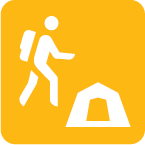
Backcountry camping
Glacier National Park
Glacier National Park offers spectacular backcountry experiences to visitors looking to step beyond roadside attractions in the park.
Camping Reservations
Reservations for the 2024 season will launch on January 19, 2024 at 8 a.m. Pacific Time. Campsite reservations are accepted at Loop Brook Campground and Hermit Meadows backcountry campground. All other campgrounds assign sites on a first come, first served basis.
Reserve your campsite!Campgrounds and huts in Glacier National Park
 Frontcountry
Frontcountry Backcountry
Backcountry Alpine Club of Canada Huts
Alpine Club of Canada HutsBackcountry camping
There are two designated backcountry campgrounds in the park, primarily serving as basecamps for mountaineering objectives. While the trails to these sites may appear short, they are both extremely steep and grueling ascents, especially with a backpack full of gear!
| Hermit Meadows | Sir Donald (backcountry) | |
|---|---|---|
| 2024 operating dates (nights) | July 1 - September 30 (snow dependent) | July 1 - September 30 (snow dependent) |
| 2024 reservation dates (nights) | July 15 - September 22 | Not applicable |
| Maximum reservable nights | 3 | 3 |
| Fees | See fees | |
| Equipment |
|
|
| Campfires | Campfires are not permitted. Gas stove use only. | |
| Number of sites | 8 | 4 |
| Maximum people per site | 4 (2 recommended) | 4 (2 recommended) |
| Required passes and permits | ||
Passes and permits
Backcountry camping permits for Sir Donald Backcountry Campground are available at the Illecillewaet Campground on a first-come, first-serve basis. Reservations for Hermit Meadows Backcountry Campground can be made through the Parks Canada Reservation Service.
Mountain goats at Hermit Meadows
Mountain goats have been frequenting Hermit Meadows Backcountry Campground. As wildlife can be attracted to the salt found in human urine, please do not urinate near the campground. Use the pit toilet, store sweaty items in bags or storage lockers and give wild animals space. Thank you for helping us keep wildlife wild and protect the safety of other visitors.
Summer random camping

Backcountry travellers venturing off the beaten path must be aware that random camping permitted areas are limited in summer (see map for more information). Many areas are snow covered well into July and avalanches can happen at any time of year.
Visit the winter camping page for information on winter random camping.
Random camping passes and permits
All park visitors require a National Park pass. For backcountry overnight use, a backcountry permit is also required and can be purchased at the Rogers Pass Discovery Centre and Illecillewaet Campground.
Special conditions for random camping
Location: At least 5km from the Trans-Canada Highway or a Parks Canada roadway, 1km from any backcountry facilities (designated campground, ACC hut or Parks Canada operational facility, 100m away from any trails and 50m from any water source.
Dogs: We recommend that you leave your dog at home. If you bring them, they must be on leash at all times.
Fires: Wood fires of any kind are not permitted. Gas stoves only.
Party size: Maximum group size is 6 persons.
Length of stay: Two-night maximum.
No trace camping
Pack it in / pack it out. All waste including toilet paper, hygiene products and food scraps.
Human waste: Dig a hole 8 to 12 inches deep away from trails and campsites and at least 70m from water sources. Loosely fill the hole with soil and rocks.
Take only pictures: Leave all rocks, fossils, antlers, wildflowers, ice and natural or historical objects as you found them for other visitors to enjoy.
Wildlife attractants
Set up cooking/eating and food storage areas at least 50 m downwind from your tent and 50m from each other.
Evaluate your destination ahead of time to determine the appropriate method of bear-resistant food storage required. Are there suitable trees to hang food and wildlife attractants with rope and a storage bag or do you need an approved bear-resistant container? You need to safely store all wildlife attractants including your food, dishes, cooking supplies, toiletries and garbage.
Wash dishes and disperse strained water in a scatter pattern on land at least 50 m from a water source and your sleeping area. Strain food particles out of dish water and store with garbage.
Random camping safety
Random camping users must be responsible for their own safety, ensuring they have the skills and experience necessary. They must be prepared for extreme weather conditions in mountainous terrain. Cell phone coverage is unavailable in most areas, an alternate means of communication is recommended. Random camping requires route finding, first aid and backpacking skills, experience and equipment.
Plan ahead, be prepared and always let someone know where you are going and when you plan to return.
For emergency: 1-877-852-3100
Random camping maps
Related links
- Date modified :
